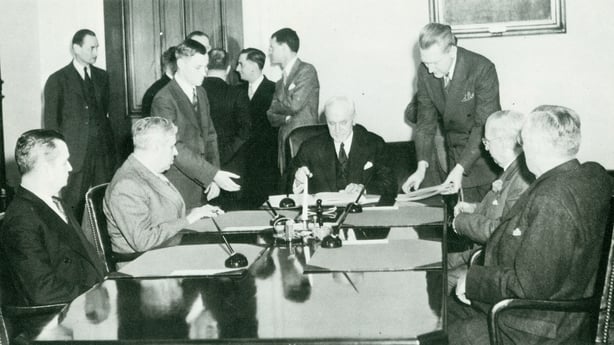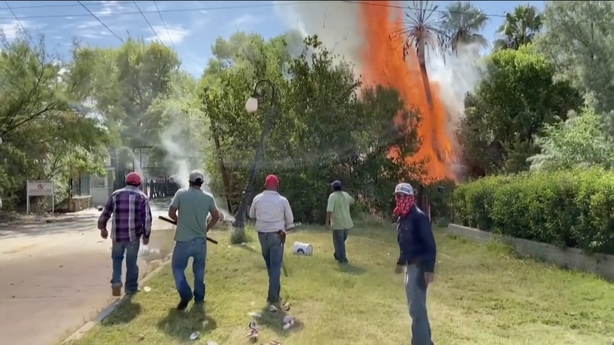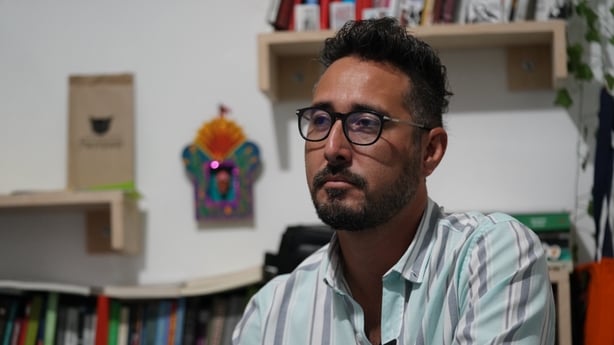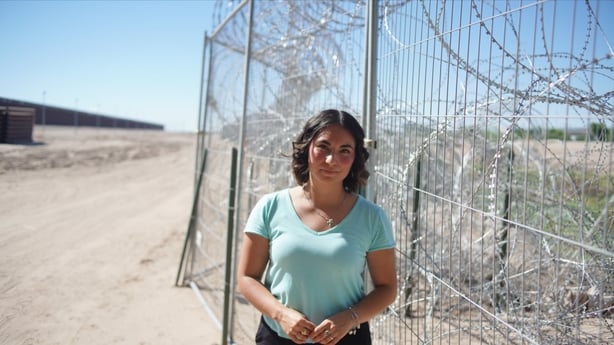The US and Mexico have a long-standing agreement to share water from the rivers that flow through both countries. But things aren't going well.
In a relationship already strained over issues like migration and drug-trafficking, a water war is brewing.
"We need Mexico to pay up," Sid Miller, Texas Commissioner of Agriculture told RTÉ News.
In 1944, the two neighbours signed a treaty which would see the delivery every five years of 1.75 million acre-feet of water from the Colorado River to Mexico.
In return, the treaty obliged Mexico to send water (1.5 million acre feet) from the Rio Grande - also known as the Rio Bravo - back to the United States.
But Mexico has fallen far behind on its deliveries - angering American politicians and farmers.
Mexico's failure to live up to its side of the bargain has killed off the sugarcane industry in Texas, Tudor Uhlhorn, chairman of Rio Grande Valley Sugar Growers, told RTÉ News.
The last sugar mill in the state was forced to close this year.
We need your consent to load this rte-player contentWe use rte-player to manage extra content that can set cookies on your device and collect data about your activity. Please review their details and accept them to load the content.Manage Preferences
Instead of meeting their treaty obligations to the United States, Mexico opted to expand their own irrigated crop acreage, Mr Uhlhorn said.
If the United States government does not force Mexico’s compliance with the 1944 Treaty, the sugar industry will be the "canary in the coal mine," he said, warning that the citrus and vegetable industries would be the next to die.

(Image: Mexican Section of the International Boundary and Water Commission)
Responding to demands from Texan farmers, Senators Ted Cruz and John Cornyn have drafted legislation that would require Washington to withhold federal aid, if Mexico fails to meet its water obligations.
Mexican authorities blame a lack of rainfall and intense heat. Daily temperatures top a hundred degrees Fahrenheit in the border region throughout the summer months.
But this excuse doesn’t fly in Texas.
"Mexico says they don't have the water to give us, but I've actually commissioned studies by drones to fly over their water sources and looks to me like they have got lots of water impounded," Commissioner Miller told RTÉ News.

"We don't want to force anybody," he said about the Senators’ proposed sanctions on Mexico.
"We want them to do it because it’s the right thing and it’s what they said they would do," he added.
Across the border in Chihuahua, Mexico - the scene of violent protests by farmers, when Mexico last attempted to deliver water to the US, in 2020 - it’s a very different story.
"The United States always wants what other countries have," Damian Lopez, an ecologist, told RTÉ News.
"They want everything," he added
"If you compare the quantity of the water in our shared rivers, they have more than we have," he said.
"The numbers don’t lie," he added.

(Image: Jordan Vonderhaar)
International disputes over water are becoming more common. A report by the UN World Water Development Report released earlier this year declared water scarcity a threat to world peace.
"People are saying that the next world war is going to be fought over water," Damian Lopez said.
Mexican conservation campaigners say that US-Mexico water treaties signed in the last century – in 1906 and 1944 – are unfair and that given today’s reality of less rain and hotter weather, they should be re-negotiated.
"The first step to resolving this dispute is by signing up to the United Nations water treaties," said Alejandro Gonzalez, an environmental activist.
"UN agreements stipulate that water must be shared between countries equally," he said.
But with tension already running high across the border, Mexico and the US may be in no mood to cooperate.
I met Vianey Rueda of the Global Center for Climate Change and Transboundary Waters at a section of the US/Mexico border fence, topped with razor wire.
The Rio Grande marks the international boundary between the two countries and once flowed at great speed between El Paso and Ciudad Juarez.
But where we stood, the riverbed was now dry.

(Image: Jordan Vonderhaar)
"As you can see, the Rio Grande is really suffering, ecologically and environmentally," she said.
Mistrust between the two countries means that any conservation strategies Mexico employs will be "viewed in a very negative light by Texas farmers who also need that water," told RTÉ News.
Expanding economies and agriculture on both sides of the border have put pressure on water supplies in the cross-border region, she explained.
"Naturally there's a lot less water than there used to be, so now people are fighting for water that really doesn't exist anymore," Ms Rueda said.
"And no side is winning," she added.






